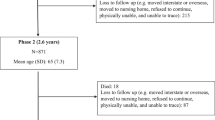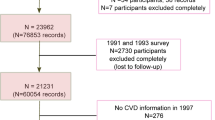Abstract
Objective: Unfavourable dietary habits might explain a part of the increased cardiovascular morbidity and mortality among the lower socioeconomic groups. The aim of the study was to describe differences in dietary intake in older subjects by socioeconomic status, as indicated by educational level.
Design: A cross-sectional analysis of socioeconomic status in relation to dietary intake.
Setting: The Rotterdam Study.
Subjects: 2213 men and 3193 women, aged 55 y and over living between 1990 and 1993 in a district of Rotterdam, The Netherlands.
Methods: Dietary data were assessed with a semiquantitative food frequency questionnaire, containing 170 food items in 13 food groups.
Results: In general, the dietary differences between socioeconomic groups were small. Lower educated subjects had a higher intake of almost all macronutrients compared with higher educated subjects. The total energy intake of men/women with the lowest educational level differed from those with the highest education in the following respect: 9.60/7.54 vs 8.94/7.17 MJ/day. Furthermore, fat composition was more adverse in the lower educated strata; in lower educated subjects, relatively more energy was derived from saturated fat (14.5/14.6 vs 13.8/13.8 energy%), the ratio of polyunsaturated saturated fat was lower (for men: 0.50 vs 0.55) and the intake of cholesterol higher (271/220 vs 240/204 mg/day). These differences could be explained by a higher intake of visible fat (46/37 vs 44/34 g/day) and more meat consumption (130/100 vs 116/86 g/day). In addition, the composition of these products differed: the higher educated used relatively more lean meat and low-fat milk products. Furthermore, the intake of fibre was lower among the lower educated (1.88/2.17 vs 2.03/2.29 g/MJ). Among lower educated groups there were more abstainers (15.5/31.5 vs 12.3/26.9%) and the type of alcoholic beverages also differed between the groups. Intake of antioxidant vitamins from food alone did not differ between educational groups.
Conclusions: In Dutch elderly people, there are socioeconomic differences in dietary intake. Although these differences are small, these findings support the role of diet in the explanation of socioeconomic inequalities in cardiovascular health.
Sponsorship: Erasmus Centre for Research on Aging, Erasmus University Rotterdam.
European Journal of Clinical Nutrition (2000) 54, 159–165
This is a preview of subscription content, access via your institution
Access options
Subscribe to this journal
Receive 12 print issues and online access
$259.00 per year
only $21.58 per issue
Buy this article
- Purchase on Springer Link
- Instant access to full article PDF
Prices may be subject to local taxes which are calculated during checkout
Similar content being viewed by others
Author information
Authors and Affiliations
Contributions
Guarantor: DE Grobbee.
Contributors: CTMvR, performed data-analyses, wrote manuscript and contributed to the design of this specific study; HvdM, designed and supervised collection of socio-economic data, contributed to the design of the analyses, and assisted in writing; JCMW, designed and supervised collection of dietary data, and assisted in writing; JPM, contributed to research design and analyses, was a principal investigator, and assisted in writing; DEG, contributed to research design and analyses, assited in writing. He was a principal investigator and co-initiator of the Rotterdam Study.
Corresponding author
Rights and permissions
About this article
Cite this article
van Rossum, C., van de Mheen, H., Witteman, J. et al. Education and nutrient intake in Dutch elderly people. The Rotterdam Study. Eur J Clin Nutr 54, 159–165 (2000). https://doi.org/10.1038/sj.ejcn.1600914
Received:
Revised:
Accepted:
Published:
Issue Date:
DOI: https://doi.org/10.1038/sj.ejcn.1600914
Keywords
This article is cited by
-
Influence of education and subjective financial status on dietary habits among young, middle-aged, and older adults in Japan: a cross-sectional study
BMC Public Health (2023)
-
Relationship between social network, social support and health behaviour in people with type 1 and type 2 diabetes: cross-sectional studies
BMC Public Health (2016)
-
Development of low fat beef patty using Cucurbita maxima Duchesne defatted seeds flour paste
Journal of Food Measurement and Characterization (2016)
-
Social and economic correlates of malnutrition in Polish elderly population: The results of PolSenior study
The journal of nutrition, health & aging (2015)
-
Nutrient-rich foods, cardiovascular diseases and all-cause mortality: the Rotterdam study
European Journal of Clinical Nutrition (2014)



